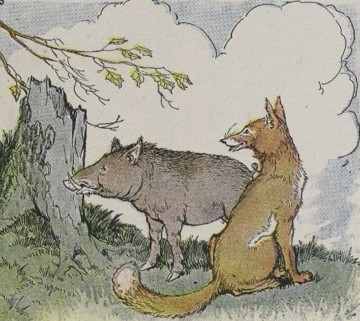PART A_1
Let’s learn vocabulary. Listen and repeat the words and the sentences with your tutor.
PART A_2
| 1. anxiously | /ANGK-shuhs-lee/ |
| -in a way that shows you are worried or nervous | |
| Amanda looked at the time anxiously. | |
| 2. grin | /grin/ |
| -a wide smile | |
| He had a big grin on his face as he walked across the hallway. | |
| 3. guarantee | /gar-uhn-TEE/ |
| -a promise that something will be done or will happen | |
| What guarantee is there that you can restore the data when disaster hits? | |
| 4. grin | /grin/ |
| -to smile broadly, especially as an indication of pleasure, amusement, or the like. | |
| The boy showed a grin on his face after receiving a gift. | |
| 5. stump | /stuhmp/ |
| -the part of something such as a tree, tooth, arm, or leg that is left after most of it has been removed | |
| The bull hit the stump of the tree. |
PART B_1
Let’s read the story. Please read them aloud, and I will check your pronunciation and intonation.
PART B_2
The Wild Boar and the Fox

A Wild Boar was sharpening his tusks busily against the stump of a tree, when a Fox happened by. Now the Fox was always looking for a chance to make fun of his neighbors. So he made a great show of looking anxiously about, as if in fear of some hidden enemy. But the Boar kept right on with his work.
“Why are you doing that?” asked the Fox at last with a grin. “There isn’t any danger that I can see.”
“True enough,” replied the Boar, “but when danger does come there will not be time for such work as this. My weapons will have to be ready for use then, or I shall suffer for it.”
“Why are you doing that?” asked the Fox at last with a grin. “There isn’t any danger that I can see.”
“True enough,” replied the Boar, “but when danger does come there will not be time for such work as this. My weapons will have to be ready for use then, or I shall suffer for it.”
Preparedness for war is the best guarantee of peace.
PART C_1
Let’s answer comprehension questions. Please answer them based on the story.
PART C_2
| 1. | What was the Boar doing when the Fox saw him? |
| 2. | What does the Fox always do to his neighbors? |
| 3. | What did the Boar tell to the Fox when asked about his preparedness? |
PART D_1
Let’s discuss the story. Please answer the questions below and express your opinions.
PART D_2
| 1. | Do you agree with the fable’s lesson? Why or why not? |
| 2. | Do you think it is right that the Boar prepared his tusks even without danger? Why or why not? |
| 3. | Why do you think the Fox wanted to make fun of the Boar? |
| 4. | What circumstances do you always prepare for? |
| 5. | How do you prepare for any danger that may come your way? |
REVIEW AND FEEDBACK
Now, let us review the things that you learned in this lesson.
ではこのレッスンで学んだことを振り返りましょう。
(Please give a short feedback on how your student did on your class.)
| Grammar 文法 |
Pronunciation 発音 | Vocabulary 単語 |
Comprehension 理解 |
|
|---|---|---|---|---|
 GOOD GOOD |
文法の誤りはほとんどなく、完全な文章で話すことができる | ほとんどの単語をはっきりと正しく発音することができる | 習った表現を適切に使うことができる | 文章を理解し、質問に正しく答えることができる |
 FAIR |
文法の誤りはあるが、完全な文章で話すことができる | 発音の練習が必要な言葉がいくつかある | たまにミスはあるが、習った表現を適切に使うことができる | 文章を完全に理解するのは難しく、質問に正しく答えられないときもある |
 POOR |
文章で話すのは難しく、単語だけで話すことができる | 発音の練習が必要である | 習った単語と表現を少しだけ使うことができる | 文章を理解するのは難しく、質問に答えるのは難しい |
Parts of this lesson material are based on:
An eBook from The Project Gutenberg.
This eBook is for the use of anyone anywhere at no cost and with almost no restrictions whatsoever. You may copy it, give it away or re-use it under the terms of the Project Gutenberg License included with this eBook or online at www.gutenberg.org
An eBook from The Project Gutenberg.
This eBook is for the use of anyone anywhere at no cost and with almost no restrictions whatsoever. You may copy it, give it away or re-use it under the terms of the Project Gutenberg License included with this eBook or online at www.gutenberg.org